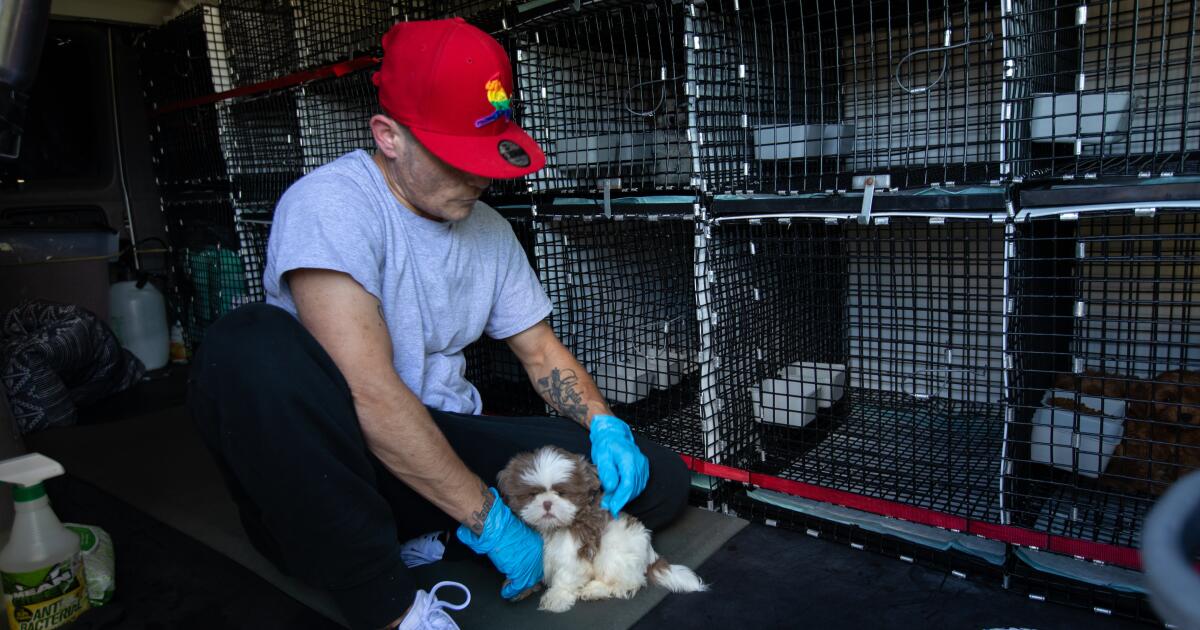Brooke Knowles knew she wanted the black puppy posted on the Facebook page of a self-described home breeder of Coton De Tulears. He looked like he’d have an outgoing personality.
She put down a nonrefundable deposit and drove to Temecula to pick him up. She paid about $2,000 and named him Ted.
Before she even left for home, Ted vomited and had diarrhea on the grass outside. He was lethargic, his chest soaked with drool.
A closer look later at the paperwork provided by the seller revealed something else unsettling: Ted wasn’t bred in California. He had been imported from a kennel in Utah.
“I thought that I was getting a dog that had been bred at his home,” Knowles said in a series of interviews with The Times. “This poor puppy, he was so traumatized.”
On Thursday, Gov. Gavin Newsom signed a series of animal welfare bills into state law that will restrict puppy sales and strengthen protections for buyers like Knowles. The bills were introduced as a result of a Times investigation last year that detailed how designer dogs are trucked into California from out-of-state commercial breeders and resold by people saying they were small, local operators.
The three bills Newsom signed into law are:
- Assembly Bill 519 by Assemblymember Marc Berman (D-Menlo Park) bans online marketplaces where dogs are sold by brokers, which is defined as any person or business that sells or transports a dog bred by someone else for profit. That includes major national pet retailers, including PuppySpot, as well as California-based operations that resell puppies bred elsewhere. The law applies to dogs, cats and rabbits under a year old. It does not apply to police dogs or service animals and provides an exemption for shelters, rescues and 4H clubs.
- AB 506 by Assemblymember Steve Bennett (D-Ventura) voids pet purchase contracts involving California buyers if the seller requires a nonrefundable deposit. The law also makes the pet seller liable if they fail to disclose breeder details and medical history.
- Senate Bill 312 by state Sen. Tom Umberg (D-Orange) requires pet sellers to share health certificates with the California Department of Food and Agriculture, which would then make them available without redactions to the public.
The bills were supported by California Atty. Gen. Rob Bonta, who said they are “an important step in shutting down deceptive sales tactics of these puppy brokers.”
“Sunlight is the best disinfectant, and it’s time to shine a light on puppy mills,” Newsom said in a statement. “Greater transparency in pet purchases will bring to light abusive practices that take advantage of pets in order to exploit hopeful pet owners. Today’s legislation protects both animals and Californians by addressing fraudulent pet breeding and selling practices.”
Lawmakers said new laws close loopholes that emerged after California in 2019 banned the sale of commercially bred dogs, cats and rabbits in pet stores. That retail ban did not apply to online sales, which surged during the COVID-19 pandemic.
The Times’ investigation found that in the years after the retail ban took effect, a network of resellers stepped in to replace pet stores, often posing as local breeders and masking where puppies were actually bred. Some buyers later discovered they had purchased dogs from sellers using fake names or disposable phone numbers after their pets became ill or died.
Times reporters analyzed the movement of more than 71,000 dogs coming into California since 2019 by requesting certificates of veterinary inspection, which are issued by a federally accredited veterinarian listing where the animal came from, its destination and verification that it is healthy enough to travel.
The California Department of Food and Agriculture has long received those health certificates from other states by mistake — the records are supposed to go to county public health departments — and, in recent years, made it a practice to immediately destroy them. Dog importers who were supposed to submit the records to counties largely failed to do so.
The Times obtained the records by requesting the documents from every other state. In the days following the story’s publication, lawmakers and animal advocates called on the state’s Food and Agriculture Department to stop “destroying evidence” of the deceptive practices by purging the records. The department began preserving the records thereafter, but released them with significant redactions.
In one instance, the state redacted the name and address of a person with numerous shipments of puppies from Ohio. The Times obtained the same travel certificates without redactions from the Ohio Department of Agriculture. The address listed on the records is for a Home Depot in Milpitas. The phone number on some of those travel certificates belongs to Randy Kadee Vo.
The Times’ reporting last year found Vo’s name and various Bay Area addresses, including a warehouse, were listed as the destination for 1,900 dogs imported into California since 2019. At the time, he disputed that number but declined to say how many he had imported. People who bought puppies from Vo told The Times that they were told they were buying puppies that were locally bred.
Shortly after The Times questioned Vo about the imports, a different name, along with the Home Depot address, began appearing on health certificates with his phone number. Vo did not respond to a request for comment.
The Times identified hundreds of records detailing other sellers with names that appear to be fake or addresses that go to unaffiliated businesses, shopping centers and commercial mailbox offices.
While the new laws were championed by animal welfare groups, some have questioned how adequately the laws will be enforced by state officials — particularly when it comes to policing out-of-state facilities selling online and then shipping puppies directly California buyers.
“Enforcement will now fall on nonprofits like ours to monitor and report issues that we see, in hopes that the agencies act,” said Mindi Callison, head of the Iowa-based anti-puppy-mill nonprofit Bailing Out Benji.
Callison said lawmakers should next turn their focus to requiring California breeders to be licensed, similar to standards in Iowa, Missouri and other states. California does not have a statewide licensing program, instead relying on local jurisdictions for oversight. While some cities and counties require breeders to be licensed and inspected, little information is available online to help consumers vet them.
“There is a higher risk of dogs being kept in inhumane conditions in states where there are no regulations to follow and have no eyes on them,” Callison said.
Opponents of the legislation argued that California’s previous attempts to cut off the supply from puppy mills by banning pet store sales only fueled an unregulated marketplace — and warned banning brokers will do the same.
“Eliminating these brokers will not reduce demand for pets; it will simply force more Californians into unregulated, riskier marketplaces,” said Alyssa Miller-Hurley of the Pet Advocacy Network, which represents breeders, retailers and pet owners, in a letter opposing the legislation.
For consumers like Knowles, the lack of transparency when buying her puppy Ted has been long-lasting and costly. More than a year after Knowles took the puppy to her home in Long Beach, he developed stomach issues that got so bad he wound up in the emergency room. She also had doubts that her puppy was a purebred Coton De Tulear as advertised.
She said a pet DNA test confirmed those suspicions and connected her with other people whose dogs were purchased from the same seller. The test results said one of the dogs share the same amount of DNA as people do with their full siblings – and that they’re mutts.
“We call him the most expensive rescue dog we’ve ever had,” Knowles said of Ted, who is now on a restrictive diet. “Our group started to call our dogs ‘Fauxtons,’ since they weren’t Cotons.”
Knowles sued the seller, Tweed Fox of Carlsbad Cotons, over the test results showing Ted was not a purebred puppy, but said she lost.
“Really the core issue is … masquerading to be something you’re not,” she said.
Fox told The Times that he began sourcing from a Utah company during the Covid pandemic, when the demand for puppies spiked beyond the number he was able to breed at home.
He thought the Utah puppies were purebreds because they came with the proper registration paperwork, but said that “turned out not to be the case.” He said he did not mislead customers because he was in fact a home breeder, and only advertised the out-of-state puppies as Coton de Tulears, “which is what I thought I was purchasing.”
“You only can breed so many in a home,” he said. “I thought I was providing equal quality puppies at the time, and apparently, I wasn’t at that point, except for my own home bred.”
Fox said he has since moved to Dallas, where he breeds and sells Cotons. While the California broker law won’t impact him now that he’s left the state, he said he refuses to buy anyone else’s puppies for resale.
“I only sell my own,” he said. “I’m not in the business to cheat people out of anything.”

